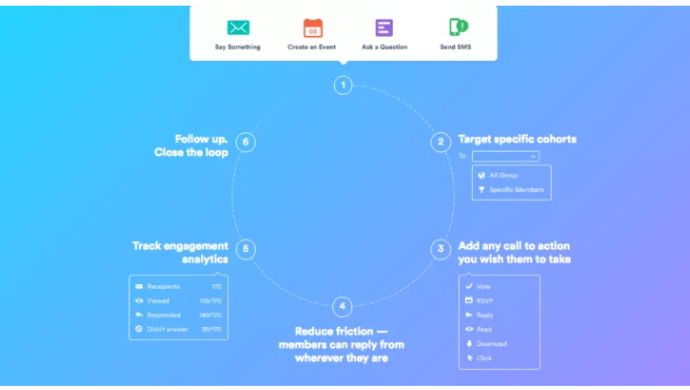CEO Sharon Savariego and CTO Arthur Vainer have built Mobilize to help companies communicate with external groups and individuals. But can it fare against Slack and others?

Mobilize CEO and Co-founder Sharon Savariego, one of Israel’s rising women entrepreneurs. Photo credit: PR
While Slack and similar tools have served internal company communications well, some have found these to be lacking in engaging with external partners, such as contractors and outside organisations. Billed as the “Slack for external communications,” Israeli startup Mobilize announced on Wednesday that it has closed a US$6.5 million Series A funding round and launched a self-service version of its tool so that everyone can try out Mobilize.
Before releasing its capabilities to the public, Mobilize tested its offerings in stealth mode with design partners such as Microsoft, the United Nations, Etsy, Salesforce, Docker, MakerFaire, MasterCard, and Prezi, among 100 others.
The current round brings the company’s total funding raised to date to nearly US$8.5 million. Led by new investor Trinity Ventures, the Series A financing included participation from existing investors Hillsven Capital, Array Ventures, UpWest Labs, CEO of Intercom.io Eoghan McCabe, and Sanjay Subhedar of Storm Ventures. This round also recruited Floodgate Ventures as a first-time financier. Before the Series A, Mobilize raised a closed funding round worth US$800,000 in June 2015 and a seed round of US$1.125 million in November 2014.
Also Read: Taking on Slack, Japan’s office communications platform ChatWork adds Vietnamese
Sharon Savariego, CEO and Co-Founder of Mobilize, explained in a statement that, “In the new economy, companies and organisations increasingly rely on large numbers of people outside their organisation to achieve their missions. Groups have become business-critical and there is a growing need for group communication within every business.”
What sets Mobilize apart from the myriad communication tools out there?

Graph showing Mobilize’s functions. Photo credit: Mobilize
There seem to be dozens of group communication tools and a growing number of external company messaging services such as Fleep and Wiggio, not to mention Front and Slack’s tools to correspond with those outside of an organisation’s platform. Mobilize appears to differentiate itself with the extent of its features, which include SMS integration, the ability to update contacts easily and export information in easy-to-use spreadsheets, event management capabilities, and user engagement analytics.
Also Read: 7 tips that will make you a Slack champion

Mobilize’s communication center. Photo credit: PR
As Savariego described to Geektime, “All of the existing communication tools are highly focussed on two main pain points: either internal team communication (Slack, Yammer, Fleep, etcetera), or customer support communication (Intercom, Front App). Mobilize is focused on a totally new market and challenge – helping companies organise and communicate with large groups and networks of partners and external workforces. Imagine the challenge of managing and communication with more than 2,000 drivers? Or more than 500 developer groups all around the world?”
She told us to, “Think of it as your group’s or network’s operating system including a full CRM (customer relationship management), communication center with emails, SMS, events, files, polls and more – and all of the analytics,” beyond just a messaging tool. “Mobilize covers the entire workflow of recruiting members and partners, organising them in one database, and communicating without friction or additional sign-ins across multiple tools,” such as Salesforce, MailChimp, or Google Docs.
If Mobilize can make this clear – that it could replace various contact management and communication tools – then it might have a shot in an increasingly crowded market. Still, it will have to convince companies who are fairly satisfied with platforms such as Slack and Salesforce to give it a go.
Also Read: Slack’s Melbourne office is open for business and it looks fantabulous
CEO Sharon Savariego and CTO Arthur Vainer founded Mobilize in 2014. Along with launching its self-service tool, which has a freemium pricing model, Mobilize will use the new financing to expand their teams in Tel Aviv and San Francisco.
—
The article Israeli group communications startup Mobilize raises $6.5 million Series A, tackles Slack first appeared in Geektime.
The post Israeli group communications startup Mobilize raises US$6.5M Series A, tackles Slack appeared first on e27.